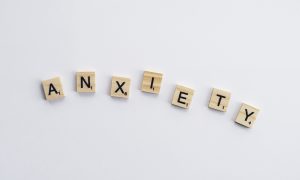
(Pexels – RDNE Stock project)
From time to time, all of us experience different levels of anxiety, and sometimes we are not able to handle it well.
However, anxiety disorders, on the other hand, are very persistent and have a greater impact on one’s day-to-day life.
Sadly, mental health issues like anxiety and depression are still not as widely talked about because they are still taboo in many settings.
This is why we have written this article to shed some light on this mental health condition and how to deal with it.
Signs And Symptoms

(Pexels – Anna Tarazevich)
We all know what stress feels like. Anxiety is basically an excessive version of it that becomes so serious that it affects our lives.
Here are the most common signs of anxiety, which include physical, mental, and behavioural signs.
- Shortness Of Breath
- Intense Fear And Over Worrying
- Irritability
- Regularly Jumpy
- Confusion
- Quickened Heart Palpitations
- Trembling Of Limbs
- Dizziness
- Headaches Or Stomach Aches
- Difficulty Sleeping
Strategies To Help Deal With Anxiety
Just like learning how to deal with stress, anxiety can also be taken under control as long as we learn effective strategies like these:
Breathing Exercises

(Unsplash – Max van den Oetelaar)
There are many resources online that provide different kinds of breathing exercises.
Try them out, and you will find out which ones are the most effective at helping you calm and relax your mind.
Keep A Diary Or Journal

(Pexels – Bich Tran)
Purchase a diary or journal and start writing down all your thoughts, worries, and feelings when you feel anxious.
Doing this helps to lessen your anxiety and also helps you identify the root causes, so you are able to either resolve them or identify potential triggers.
Talk About It With Your Loved Ones

(Pexels – cottonbro studio)
It’s always nice and reassuring to know that we have people we trust to talk about our feelings and thoughts with.
It’s a form of relief, and acknowledging this support provided by them helps us grow closer to them as well.
If you do not have people whom you trust your thoughts with, or just do not want to tell them, you can contact helplines such as Samaritans of Singapore (SOS) at 1-767 or the Institute of Mental Health (IMH) Mental Health Helpline at 6389 2222. Both of these helplines operate 24 hours a day.
Listen To Music

(Pexels – Jessica Lewis)
Listening to calming music can help soothe your nerves and act as a sort of relief.
Meditation

(Pexels – Andrea Piacquadio)
Take some time out of your daily schedule to practise meditation and mindfulness.
They do not require much effort or time and can also be done by just lying down and closing your eyes.
Your Safe Space

(Pexels – Luis Dalvan)
Patients with existing anxiety disorders often have their own safe spaces to go back to when they are anxious.
It can be a physical place or an imaginary one, and there are no boundaries or restrictions to what it is or is inside it, as long as being there makes you feel safe and calm.
Take Care Of Your Physical Health

(Pexels – Ketut Subiyanto)
Taking care of your body can also help with anxiety.
Try to allocate more time for sleep and rest, and keep a healthier diet for more energy. It may be tough, but also try to do some physical exercises.
Remember to do all of these only within your comfort zone.
Seek Help From Professionals

(Pexels – Pixabay)
All in all, it is best to consult a medical doctor for help in dealing with your symptoms.
Since everyone’s experiences are different, doctors can provide specialised treatment for each patient.
Conclusion

(Pexels – Suzy Hazelwood)
By understanding what anxiety is, its causes, and its potential triggers, you can better tackle the condition.
Having strong social support while implementing these strategies in this article will lessen the effects anxiety has on your day-to-day life.
We hope this article has shed some light on the topic of anxiety and that those who suffer from it get the help they need early before the condition worsens.
